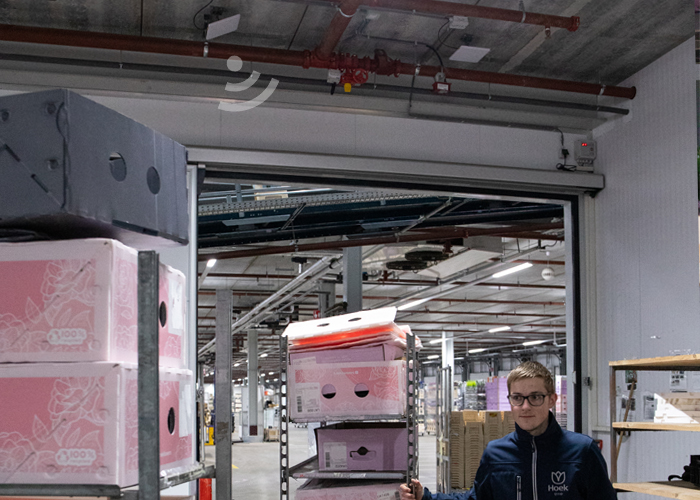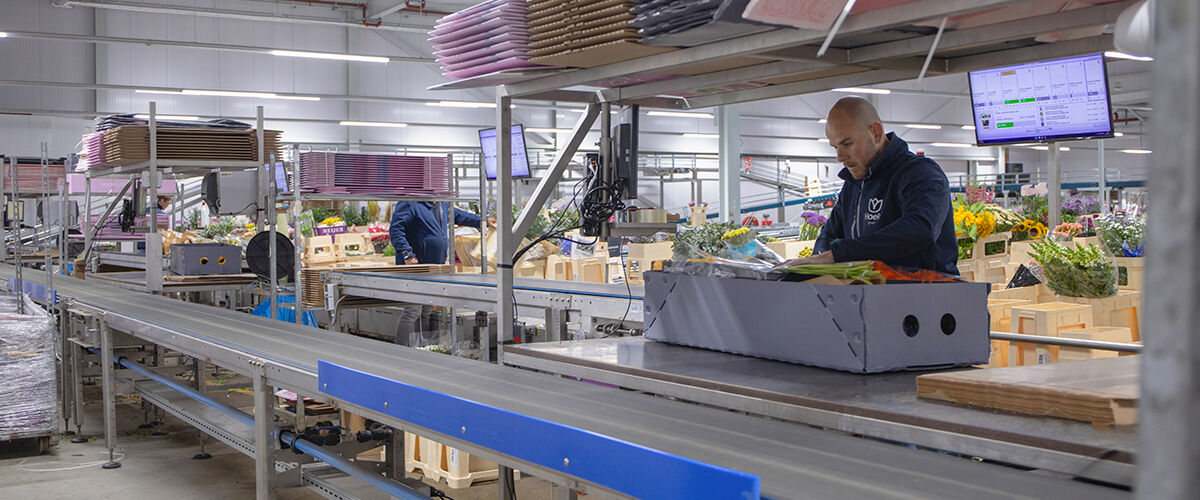RFID Case Study: Automating inventory control for reusable flower boxes
Hoek Group, an international logistics company in the worldwide purchase and sales of flowers and plants, faced challenges in tracking and managing its reusable packaging. To address these issues, Hoek partnered with RTiOT, a provider of innovative tracking and tracing solutions, to create smart returnable transport items. This case study explores how RTiOT's RFID technology helped Hoek enhance its logistics operations, improve efficiency and ensure the return of its packaging materials.
Challenge
Hoek Group's transition from single-use cardboard boxes to reusable plastic boxes needed a robust tracking system to monitor the movement of approximately 100,000 pink sustainable boxes. These boxes are shipped internationally, particularly to countries like UK, Ireland, Germany and Denmark. The primary challenge was to ensure the return of these packaging materials to Hoek for reuse, as opposed to the one-way disposal of cardboard boxes. Before implementing RTiOT's solution, Hoek struggled with the manual scanning of each container, which was time-consuming and prone to errors. The company needed a scalable, efficient and automated system to track box movements accurately and in real-time, ensuring a continuous supply cycle.
Solution
RTiOT proposed an integrated RFID solution tailored to Hoek's requirements.
Packing with Precision:
The process begins at the packing tables, each equipped with a Caen R1250I RFID reader. As boxes are filled with products, the reader captures their UHF RFID tag and connect it to the customer order information. After completing the order the data is shared with Posito. This ensures accurate tracking from the very first step.
Automated Portals for seamless processing upon return.
Two strategically placed RFID portals manage incoming flow:
- Dirty Box Portal: Equipped with an Impinj R700 reader and a Times-7 A5010 antenna, this portal automatically scans pallets filled with used boxes upon arrival. This eliminates manual scanning, updates inventory in real-time (marking them as "dirty" for cleaning), and significantly reduces processing time.
- Clean Box Portal: Cleaned and inspected boxes pass through this portal with similar technology. The system reads the tags again, updating their status to "clean" and ready for reuse. This two-step process ensures only properly sanitized crates re-enter the logistics cycle.
Flexibility with Handheld Scanners:
For situations beyond the fixed portals, RTiOT provided robust Chainway C72 handheld scanners. These scanners act as a backup, allowing for spot-checks or scanning boxes that might miss the portals. This ensures all is accounted for, regardless of its path through the facility.
Powerful Software: The Brains of the Operation
A crucial element of the system is RTiOT’s developed software called Posito. This software seamlessly integrates with Hoek's existing warehouse management system (WMS), collecting and processing data from all RFID readers. Posito provides a comprehensive view of the reusable flower box movements, tracking their status, location, and destination. It also offers advanced analytics to optimize logistics processes and identify potential issues.

Result
The implementation of RTiOT's RFID solution has significantly benefited Hoek in several key areas:
- Improved traceability: Ability to track reusable boxes when they are sent out and upon their return, ensuring accurate inventory tracking and accountability for these stages.
- Operational efficiency: Elimination of manual scanning, leading to substantial time savings and reduced labor costs. Previously labor-intensive processes have been streamlined through automated scanning portals.
- Enhanced stock control: Real-time insights into container stock levels at their facilities, optimizing inventory management and reducing the number of boxes needed in circulation.
- Cost savings: Decreased need for purchasing new boxes and lowered operational costs due to the efficiency gains from automation.
- Customer Accountability: Ability to monitor container retention times with clients, promoting timely returns and maintaining a steady supply.
Future Plans
Hoek Group plans to expand their RFID system by installing additional gates at international hubs to monitor movements more comprehensively. This will provide earlier detection of returns and more timely inventory data. Additionally, they are considering deploying more RFID checkpoints throughout the logistics process, including at distribution centers and customer locations, to potentially gain a more detailed view of box movements.
Conclusion
RTiOT's RFID solution has transformed Hoek's logistics operations, providing a robust, automated system for tracking their reusable flower boxes. The implementation has led to improved efficiency, cost savings and greater control over their logistics processes. As Hoek continues to expand its use of RFID technology, the company is well-positioned to achieve even greater levels of automation and data-driven decision-making, reinforcing its role as a leader in the flower industry.
Used Cisper products:
